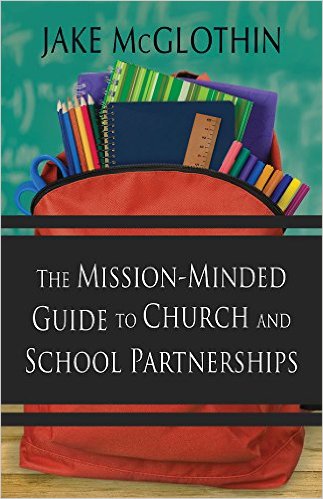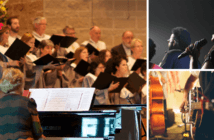Jake McGlothin, author of The Mission-Minded Guide to Church and School Partnerships, says it’s only logical that the two most important social institutions in our society should work together. He outlines what churches can share with schools as well as how engagement with schools can positively impact a congregation.
This article was originally published on February 22, 2017.
Two of the greatest and most important social institutions in America are the public school and the church. Most communities in America have a school and a church, usually more than one of each. These institutions have shaped a significant amount of our culture, as our right to worship and our right to an education are cornerstones of the American experience. Both schools and churches are deeply interested in helping people learn and work toward wholeness and better character. It makes sense for these two great institutions to work together to improve communities.
- Volunteers. Churches can provide schools with human resources through the work of trained and passionate volunteers. They can act as mentors, after-school volunteers, classroom assistants, and the like. They can provide support, encouragement, and learning to students in a committed fashion.
- Resources. Churches can provide schools with material resources. Sometimes this may be food; sometimes it may be donations of clothing or other durable goods. Churches are filled with people driven by their faith to give generously. With this in mind, churches can also provide financial resources to help with special needs and funds for particular programs.
- Community Support. Most important, churches can provide schools with the opportunity for deepening community. Churches can become advocates for schools. The church is a gathering of people that can have real and tangible impacts. And there is power in numbers, collective interest in solving problems, and communities that can enable and enlighten a widening circle of people. Churches, by getting involved in schools, can show that communities can have meaningful and mutually beneficial relationships even in the brokenness of today’s society. In our world of brokenness and fractured community, these partnerships can be a glimpse into the kingdom of God.
It’s also important to recognize the impacts that schools can have on churches.
- Community awareness. Schools offer churches an opportunity to better understand the community and its challenges. Schools tend to be microcosms of the greater community; by working with local staff, families, and children, congregations can learn more about their communities and seek ways to be more engaged in community development and building. One simple way to learn more about the state and future of a community would be to visit a local school!
- Sustained missional engagement. Schools can help deepen a church’s sense of mission in the community. The excitement of mission trips to foreign lands leads to the idea that if you want to be transformed through missions in a church environment, you have to go on a mission trip. While there is much to be said about short-term missions and what they do for spiritual transformation, something powerful happens when a church and its members make a sustained, long-term commitment to another institution in its community. The number of people I’ve met whose lives have been changed because they took a leap of faith to serve the children within our partnership grows daily.
- Understanding and compassion. Schools can give members a better understanding of compassion and justice. Issues of oppression and poverty can be very hard to understand, especially when you only look at data. Realizing that millions of children live in poverty in the U.S. can be very overwhelming and hard to wrap your brain around. We can be desensitized by the sheer breadth of the challenges and issues we face in our communities. Schools are microcosms of the community. While you may not be able to fully understand poverty as a whole, getting to know children who struggle can help members have a better understanding of the issues, thus growing their compassion. With compassion comes a quest for justice on behalf of those who can’t advocate for themselves.
Congregations across the country are starting to move in this direction, and many have already made the leap and partnered with schools over many years and even decades. Partnerships between churches and schools are a natural progression toward meaningful community engagement and ultimately a glimpse into the kingdom of God.
This material is adapted from The Mission-Minded Guide to Church and  School Partnerships (Abingdon Press, 2017) by Jake McGlothin. Used by permission. The book is available at Abingdon Press, Cokesbury and Amazon.
School Partnerships (Abingdon Press, 2017) by Jake McGlothin. Used by permission. The book is available at Abingdon Press, Cokesbury and Amazon.
Related Resources
- 50 Ways to Engage Local Schools, a free Lewis Center resource
- Effective Church-School Partnerships by Nicole Baker Fulgham
- Engaging Local Schools, a Lewis Center video tool kit resource






